Related Research Articles
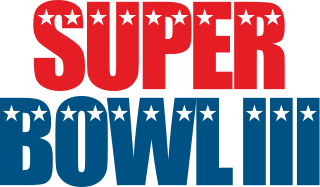
Super Bowl III was an American football game played on January 12, 1969, at the Orange Bowl in Miami, Florida. It was the third AFL–NFL Championship Game in professional American football, and the first to officially bear the trademark name "Super Bowl". Super Bowl III is regarded as one of the greatest upsets in both American football history and in the history of professional sports. The 19 1⁄2- points underdog American Football League (AFL) champion New York Jets defeated the National Football League (NFL) champion Baltimore Colts by a score of 16–7.
The second AFL–NFL World Championship Game was an American football game played on January 14, 1968, at the Orange Bowl in Miami, Florida. The National Football League (NFL)'s defending champion Green Bay Packers defeated American Football League (AFL) champion Oakland Raiders by the score of 33–14. This game and the following year's are the only two Super Bowls played in the same stadium in consecutive seasons.
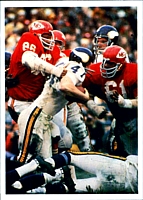
Super Bowl IV was an American football game played on January 11, 1970, at Tulane Stadium in New Orleans, Louisiana. It was the fourth and final AFL–NFL World Championship Game in professional football prior to the AFL–NFL merger taking effect the following season. The American Football League (AFL) champion Kansas City Chiefs defeated the National Football League (NFL) champion Minnesota Vikings by the score of 23–7. This victory by the AFL squared the Super Bowl series with the NFL at two games apiece as the two leagues merged after the game.
Daryle Pasquale Lamonica was an American professional football quarterback who played in the American Football League (AFL) and the National Football League (NFL) for 12 seasons, primarily with the Oakland Raiders. Lamonica was drafted by the NFL Green Bay Packers in round 12 with the 168th overall pick. He spent his first four seasons mostly as a backup for the Buffalo Bills, who selected him in the 24th round of the 1963 AFL Draft. Lamonica played his next eight seasons as the primary starter of the Raiders, including after they joined the NFL through the AFL–NFL merger.
The National Football League playoffs for the 1991 season began on December 28, 1991. The postseason tournament concluded with the Washington Redskins defeating the Buffalo Bills in Super Bowl XXVI, 37–24, on January 26, 1992, at the Hubert H. Humphrey Metrodome in Minneapolis, Minnesota.
For its first nine seasons, 1960 through 1968, the American Football League determined its champion via a single playoff game between the winners of its two divisions.

The National Football League playoffs for the 1970 season began on December 26, 1970. The postseason tournament concluded with the Baltimore Colts defeating the Dallas Cowboys in Super Bowl V, 16–13, on January 17, 1971, at the Orange Bowl in Miami, Florida.
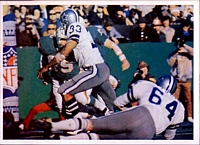
The National Football League playoffs for the 1971 season began on December 25, 1971. The postseason tournament concluded with the Dallas Cowboys defeating the Miami Dolphins in Super Bowl VI, 24–3, on January 16, 1972, at Tulane Stadium in New Orleans, Louisiana.
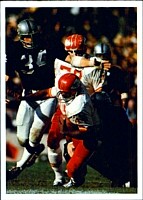
The 1969 Kansas City Chiefs season was the team's tenth, their seventh in Kansas City, and the final season of the American Football League (AFL). It resulted in an 11–3 regular season record and three postseason road victories, including a 23–7 victory in Super Bowl IV over the NFL's heavily favored Minnesota Vikings.
The 1967 Oakland Raiders season was the team's eighth in Oakland. Under the command of second-year head coach John Rauch, the Raiders went 13–1 (.929), an American Football League (AFL) record, and captured their first Western Division title, four games ahead of runner-up Kansas City, the defending league champion.
The 1967 AFL Championship Game was the eighth American Football League championship game, played on December 31 at Oakland-Alameda County Coliseum in Oakland, California.

The 1966 Season was the 7th season for the San Diego Chargers as a professional American Football League (AFL) franchise; the team failed to improve on their 9–2–3 record from 1965. In the team's final season at Balboa Stadium, the Chargers went 7–6–1 and finished in third place in the AFL West Division. They would move to San Diego Stadium for the following season. It was the first season to feature an AFL-NFL World Championship Game, now known as the Super Bowl. San Diego began the season among the favorites to represent the AFL in the historic game, but faded after a 4–0 start, winning only three more times in the remaining ten games.

The 1965 San Diego Chargers season was their sixth as a professional AFL franchise; the team improved on their 8–5–1 record in 1964. Head Coach Sid Gillman led the Chargers to their fifth AFL West title with a 9–2–3 record, before losing the AFL Championship Game to the Buffalo Bills for the second consecutive season. It would prove to be the Chargers' last post-season appearance until 1979.
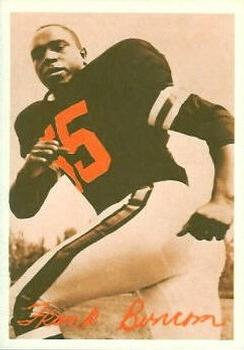
The 1964 San Diego Chargers season was their fifth as a professional AFL franchise; the team failed to repeat as AFL champions after winning the championship in 1963 with a record of 11–3, and finished at 8–5–1. San Diego struggled at the start and finish of the season, but a six-game winning streak in the middle proved to be enough to win the AFL West, in a league where the two strongest teams were in the Eastern division.
The 1972 Houston Oilers season was their 13th season overall and third with the league. The team failed to improve on their previous season's output of 4–9–1, winning only one game. They missed the playoffs for the third consecutive season.
The 1969 Houston Oilers season was the tenth and final season for the Houston Oilers as a professional AFL franchise before moving to the National Football League when the two merged. The team equaled their 1968 record of 7–7 (.500), finishing 6–6–2. They qualified for the playoffs but lost in the divisional round to the Oakland Raiders.

The Heidi Game or Heidi Bowl was a 1968 American Football League (AFL) game between the Oakland Raiders and the visiting New York Jets. The contest, held on November 17, 1968, was notable for its exciting finish, in which Oakland scored two touchdowns in the final minute to win the game 43–32. However, NBC, the game's television broadcaster, decided to break away from its coverage on the East Coast to broadcast the television film Heidi, which caused many viewers to miss the Raiders' comeback.
The 1968 AFL Championship Game was the ninth annual title game of the American Football League, played on December 29 at Shea Stadium in Queens, New York City, New York. In a rematch of the notorious Heidi Game played earlier in the season, the New York Jets (11–3) of the Eastern Division hosted the defending champion Oakland Raiders (12–2) of the Western Division. Although the Raiders had the better record, the Jets were slight favorites. The Raiders had hosted a tiebreaker playoff game the week before against the Kansas City Chiefs (12–2) to determine the Western Division champion, while the Eastern champion Jets won their division outright and thus were idle.

The 1969 AFL Championship Game was the tenth and final championship game of the American Football League, and the league's final game prior to its merger with the National Football League on February 1, 1970.
References
- ↑ "Jets not favored in AFL playoffs". Milwaukee Journal. press dispatches. December 21, 1969. p. 23.
- ↑ "Chiefs defeat Jets as 63,849 watch". Milwaukee Journal. press dispatches. November 17, 1969. p. 19.
- ↑ Jones, Robert F. (November 24, 1969). "The Chiefs had the hot hand". Sports Illustrated. p. 16.
- ↑ Anderson, Dave (December 21, 1969). "Chiefs dethrone Jets, 13-6". Milwaukee Journal. New York Times. p. 1, sports.
- ↑ "Chiefs end New York Jets' Super Bowl dreams 13-6". Lewiston Morning Tribune. (Idaho). Associated Press. December 21, 1969. p. 12.
- ↑ "Archived copy" (PDF). media.kcchiefs.com. Archived from the original (PDF) on January 13, 2014. Retrieved May 22, 2022.
{{cite web}}: CS1 maint: archived copy as title (link) - ↑ "Today in Pro Football History: 1969: Chiefs Defeat Jets in AFL Divisional Playoff". December 20, 2012.
- ↑ "It's Oilers and Raiders today". Reading Eagle. (Pennsylvania). Associated Press. December 21, 1969. p. 66.
- 1 2 "Raiders say they're ready for the Chiefs". Reading Eagle. (Pennsylvania). Associated Press. December 22, 1969. p. 42.
- ↑ 1969 NFL-AFL Commentator Crews Archived 2008-12-11 at the Wayback Machine
- ↑ "Vikings, Chiefs gain Super Bowl". Milwaukee Sentinel. UPI. January 5, 1970. p. 1, part 2.
- ↑ Rathet, Mike (January 5, 1970). "Viks, Chiefs storm to Super Bowl showdown". Eugene Register-Guard. (Oregon). Associated Press. p. 3B.
- ↑ Jones, Robert F. (January 12, 1970). "Lamonica's moveable feast: he was the main dish". Sports Illustrated. p. 17.
- ↑ "Chicago Tribune: Chicago news, sports, weather, entertainment".
- ↑ "The 1969 Kansas City Chiefs: Two Championships in One Season". Bleacher Report .